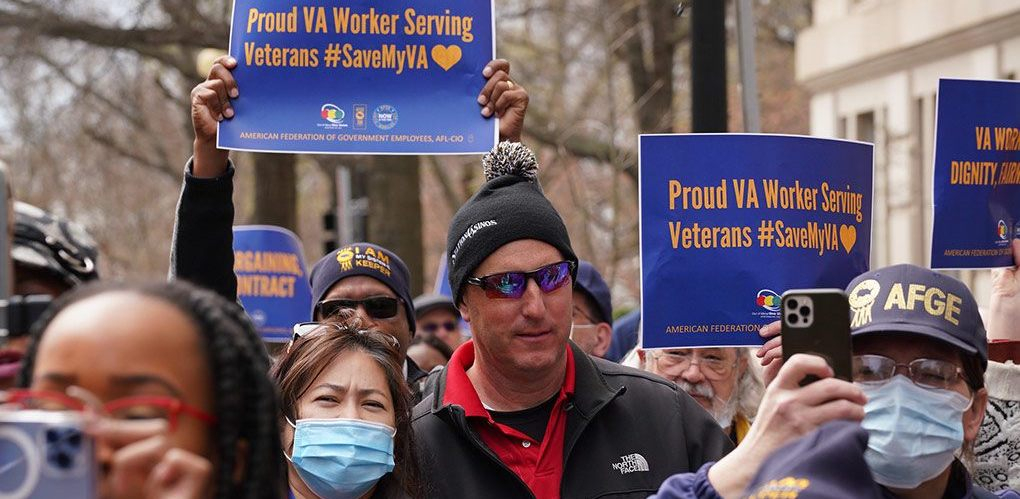VA Firings Reversed, So Trump Makes Grievance Settlement a Campaign Issue

Government Employees (AFGE) members at the Veterans Administration protested a new congressional assault on their due process rights in July. The union won reinstatement for thousands of workers when an earlier version of the law was used to target workers unfairly. Photo: AFGE.
It’s rare that a union grievance settlement becomes a U.S. presidential campaign issue. But thanks to the American Federation of Government Employees’ successful defense of workers unfairly dismissed by the Department of Veterans Affairs, Donald Trump is now running for the White House on a platform that includes firing “every corrupt VA bureaucrat who Joe Biden has outrageously refused to remove from the job or put back in the job.”
Trump made that pledge during a recent speech in New Hampshire, delivered shortly after AFGE and the VA settled their long-running dispute about the impact of Trump-era legislation on the due process rights of 300,000 VA staffers.
Thousands of fired workers will be eligible for reinstatement or back pay, at a total cost estimated in the hundreds of millions of dollars, the Federal News Network reported. (Hundreds of others terminated for “grievous misconduct” will not be eligible.)
This agreement ended a five-year legal battle over the VA Accountability and Whistleblower Act, a 2017 measure championed by Florida Republican Senator Marco Rubio and passed with bipartisan backing. The new law enabled the fast-track firing of VA employees, ostensibly over misconduct or poor performance.
As the Federal Labor Relations Authority later found, Trump’s VA Secretary Robert Wilkie failed to bargain with AFGE over the impact and implementation of the new law. Instead, no longer encumbered by what he called “bureaucratic protections that bad employees use to stay on for life,” Wilkie unleashed a wave of dismissals.
As we report in our book Our Veterans, during the first six months the VA Accountability Act was in effect, only a handful of higher-level officials were removed for their poor performance or misconduct. Meanwhile there were 1,264 other discharge cases—all involving low-level employees who worked in VA claims processing, food service, and housekeeping jobs.
Veterans comprise about a third of the agency’s workforce. Some VA patients with a history of homelessness or mental illness can qualify for compensated work-therapy programs at VA facilities. Even these disabled workers were at risk of unfair discipline under the Accountability Act.
DUE PROCESS STILL UNDER FIRE
On the campaign trail in New Hampshire, Trump promised to put the Accountability Act “back in full force” when and if he returns to the White House.
Meanwhile House Republicans are trying to pass a similar law, the Restore VA Accountability Act, to once again fast-track VA firings whether Trump wins or loses. This bill would allow the third-largest federal agency to demote, suspend, and fire workers based on a lesser standard of proof than was already successfully challenged in a federal appeals court decision. According to AFGE, it would also undermine the new collective bargaining agreement negotiated with the VA this year.
Trump launched an all-out assault on federal employee rights during his four years in office. In 2018 he used a series of executive orders to further modify disciplinary procedures, weaken seniority rights, and limit the long-established practice of allowing union stewards to spend compensated time representing their coworkers during working hours.
VA management began to remove AFGE offices from agency property, making it harder for workers with job-related questions and concerns to access union reps. A union lawsuit temporarily blocked these changes, but they were finally implemented in February 2020. In bargaining with AFGE and other VA unions, Trump appointees sought major concessions from AFGE, including weakening job safety and health protections.
WHISTLEBLOWER PROTECTION FOR WHOM?
The 2017 law also established an Office of Accountability and Whistleblower Protection, with dozens of investigators. Its first director, Peter O’Rourke, was a Republican Party operative not very interested in rooting out “corrupt bureaucrats” among his fellow Trump appointees.
O’Rourke ended up “collecting pay, but doing little work,” as the Washington Post reported, and was forced to resign in 2018. During his brief tenure he was also accused of protecting political allies within the agency who were under investigation. As of late 2019, several thousand whistleblower complaints had been received, but only one resulted in any recommended discipline of a senior official, according to the Project on Government Oversight.
In the meantime, actual whistleblowers like Patty Stamos paid a heavy price.
Stamos, then a member of AFGE Local 2152, was a licensed clinical social worker at a community-based clinic in Auburn, California, which serves about 4,000 veterans. According to Stamos, “over 50 mental health patients, some high risk for suicide, failed to receive vital mental health care” during two periods of her approved absence.
After making this supposedly “protected disclosure” to management, she became the subject of supervisory complaints about delays in her written documentation of work with a heavy caseload of patients. During her nearly five years at the VA, she had never been put on a Performance Improvement Plan or received any prior discipline. But in early 2018, she was fired.
Stamos believes that the Accountability Act, contrary to its stated purpose, “did not hold VA mental health management accountable for abuses of power and neglect of veterans. It did not protect me, or any other VA employee from whistleblower retaliation. And it did not protect vulnerable veterans whose mental health treatment was sidelined for months.”
Stamos is now employed at a private clinic in Oregon; she is eligible for back pay and reinstatement under the AFGE grievance settlement. She is still jousting with HR at the VA over what kind of job they are now offering her. Stamos estimates that her back pay, minus interim earnings, will amount to hundreds of thousands of dollars.
Ian Hoffmann, a former AFGE legislative-political rep, helped other VA caregivers in California and Nevada lobby against the VA Accountability Act. He saw firsthand “how the actions of top managers appointed by Trump, who were hostile to the mission of the agency, made personnel policies, working conditions, and staffing levels immeasurably worse,” he said.
The Act had a far more adverse impact on the VA’s 9 million patients than any individual failings of union-represented workers or lower-level managers in the nation’s largest public health care system.
Steve Early and Suzanne Gordon are NewsGuild/CWA members and co-authors of a new book Our Veterans: Winners, Losers, Friends and Enemies on the New Terrain of Veterans Affairs from Duke University Press. Gordon is also co-founder of the Bay Area-based Veterans Healthcare Policy Institute. They can be reached at Lsupport[at]aol[dot]com.



